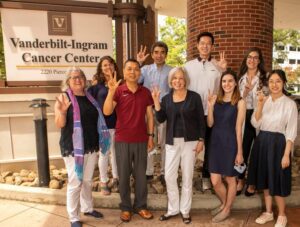 Dr. Richmond received her Bachelor of Science degree from Northeast Louisiana University, her Master of Natural Sciences degree from Louisiana State University and her Ph.D. in Developmental Biology at Emory University in 1979. She conducted postdoctoral research in Tumor Biology at Emory, and then joined the faculty there, rising to the rank of associate professor of Medicine before moving to Vanderbilt in 1989 as tenured associate professor of Cell Biology and Medicine and as a research career scientist at the U.S. Department of Veterans Affairs Nashville campus. She was promoted to full professor in 1995, and she was appointed professor and vice chair of the Department of Cancer Biology in 2000. Currently Dr. Richmond is the Ingram Professor and Director of the Program in Cancer Biology.
Dr. Richmond received her Bachelor of Science degree from Northeast Louisiana University, her Master of Natural Sciences degree from Louisiana State University and her Ph.D. in Developmental Biology at Emory University in 1979. She conducted postdoctoral research in Tumor Biology at Emory, and then joined the faculty there, rising to the rank of associate professor of Medicine before moving to Vanderbilt in 1989 as tenured associate professor of Cell Biology and Medicine and as a research career scientist at the U.S. Department of Veterans Affairs Nashville campus. She was promoted to full professor in 1995, and she was appointed professor and vice chair of the Department of Cancer Biology in 2000. Currently Dr. Richmond is the Ingram Professor and Director of the Program in Cancer Biology.
Dr. Richmond is internationally known for her research on chemokines, small “chemotactic” proteins that attract inflammatory cells. She was the first to demonstrate that a chemokine can regulate tumor growth. Her early research involved purification and sequencing of one of the first known chemokines, CXCL1, and her lab played a major role in characterization of the role of its receptor, CXCR2, in leukocyte trafficking, inflammation, angiogenesis, wound healing and tumor progression. She and her colleagues helped elucidate the role that inhibitor of kappa-beta kinaseβ (IKKβ), an activator of the transcription factor NF-κB, plays in chemokine expression and melanoma cell survival, suggesting that IKKβ may be a potential target for melanoma therapy. They also have shown that targeting the NF-kB/IL-6/STAT3 pathway is a rational strategy for treating angiosarcoma.
Dr. Richmond’s body of work — more than 200 publications cited by other scientists more than 10,000 times – has shed light on how the inflammatory process, combined with other genetic and environmental factors, contributes to tumor progression and metastasis. A goal of her research is the advancement of “personalized cancer therapy” — determining which genes are mutated or amplified in individual tumors and delivering drugs that specifically inhibit the activity of those genes. Antagonizing chemokine receptors may provide new therapeutic options. Toward that end, she and her colleagues are working to learn more about the effects of therapy on the tumor microenvironment, including the development of drug resistance.

The Richmond laboratory investigates the intracellular signals that are important in the tumor microenvironment and in the pre-metastatic niche to reduce the establishment of metastatic lesions. My lab has worked to investigate the role of inflammatory mediators in cancer progression and mechanisms for controlling the negative impact of inflammatory mediators using basic cancer biology principals that can be translated to the clinic. Recently, following basic discoveries on the pathways involved in tumor growth, we have developed translational studies using patient derived xenograft models to explore new therapeutic approaches for breast cancer and melanoma. We have shown that phosphoinositide 3-kinase (PI3K) inhibitors inhibit tumor growth in part through modulation of the immune cell infiltrate in the tumor and inhibition of PI3Kγ as well as PI3Kα are crucial for inhibiting tumor growth directly and for reprogramming the tumor associated macrophages to an anti-tumor phenotype. The result is a significant increase in M1-like macrophages with elevated NF-κB activity, enhanced tumor infiltrating CD8+T effector cells, reduction in Tregs, and enhanced macrophage anti-tumor activity. In melanoma, we have previously shown that while targeted deletion of IKKβ in tumor cells blocks oncogene mediated transformation, targeted deletion of IKKβ in myeloid cells leads to enhanced tumor growth and metastasis for melanoma tumors. We have worked to determine how inflammatory signals from tumors induce the chronic and elevated expression of chemokines and/or their receptors to recruit leukocytes that enhance or inhibit tumorigenesis and metastasis. Moreover, we have characterized the role of CXCR4 in the aggressiveness of breast cancer, demonstrating that inhibition of CXCR2 and CXCR4 blocks the recruitment of myeloid-derived suppressor cells (MDSCs) to the pre-metastatic niche and inhibits metastasis. We are experienced in the characterization of leukocyte interaction with the tumor microenvironment and in identification of subsets of these cells within the tumor using multi-color FACS. We are currently characterizing the role of immune checkpoint inhibitors in combination with several small molecule inhibitors that affect melanoma and breast cancer growth and metastasis using patient derived xenografts and tumor organoid cultures. We have an outstanding group of collaborators and access to phenomenal infrastructure for acquiring patients, obtaining informed consent, tissue collection, patient follow-up, and access to patients in clinical trials. Dr. Richmond has trained ~ 50 graduate students and postdoctoral fellows and over 30 undergraduate students during her career thus far, most of whom have gone on to highly successful careers in science. She serves as co-PI of the U54 Cancer Health Disparities grant that supports Meharry/VICC/TSU research and educational outreach.